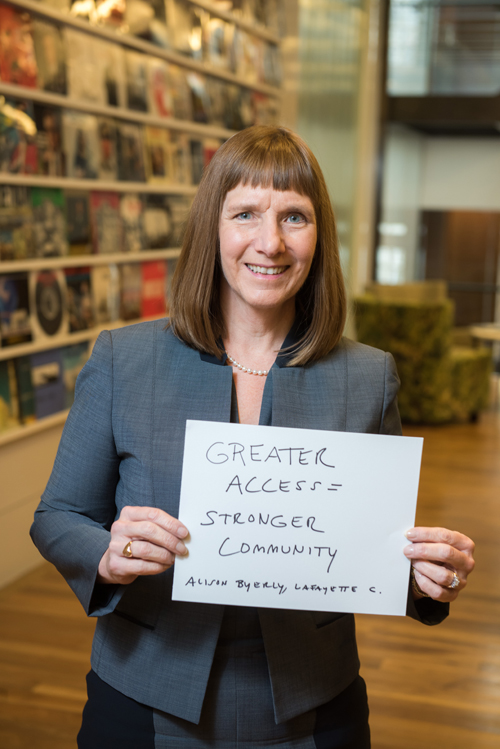As part of its plan to admit outstanding applicants regardless of their families’ finances, Lafayette College is joining an alliance of nearly six dozen leading colleges and universities that are committed to expanding the number of talented low- and moderate-income students they enroll.
The alliance, called the American Talent Initiative (ATI), is funded by Bloomberg Philanthropies and includes all eight Ivy League schools, four University of California campuses, and 10 Pennsylvania colleges and universities among its 68 members. The alliance was launched in December 2016 with a goal of educating 50,000 additional high-achieving, lower-income students at the 270 colleges and universities with the highest graduation rates by 2025. (See the membership list at the end of this article.)

“Living and learning with people from a wide range of backgrounds and experiences is at the heart of the immersive liberal arts education that we provide,” says President Alison Byerly. “Making a Lafayette education more accessible to a broader range of students will not only benefit talented students, it will enrich the entire community.”
To support its affordability initiative, Lafayette is growing its student body by 400 students, to 2,900 total, over the next six to eight years; reallocating some merit scholarships to need-based aid; setting aside 1 percent of any tuition increase to directly fund more financial aid; and making financial aid a special priority in its fund-raising efforts.
Research shows that when high-achieving, lower-income students attend institutions such as those associated with the American Talent Initiative, they graduate at higher rates, and access to those institutions provides them with a much greater chance of attaining leadership positions and opportunity throughout their lives. Yet each year, there are at least 12,500 lower-income high school graduates with outstanding academic credentials who do not enroll at institutions where they have the greatest likelihood of graduating.
“We know that students from a range of backgrounds, including those who are the first generation in their families to attend college, can flourish at Lafayette, and we are committed to seeking out those students,” says Greg MacDonald, vice president for enrollment management.
The College’s partnerships with community-based organizations and charter school networks across the country that educate and support underrepresented students have contributed to record-high applications to Lafayette in five of the last six years, including a doubling of applications from domestic students of color. Applications for financial aid have grown by 77 percent, and the College is exploring additional network partnerships in Texas and California.
“No one college can do this on its own,” says Byerly. “But by coming together in this initiative, America’s highest-performing colleges and universities can transform enough lives to impact our nation’s future.”
Colleges and universities participating in the American Talent Initiative will further the national goal of developing more talent from every American neighborhood by:
- Recruiting students from diverse socio-economic backgrounds through robust outreach;
- Ensuring that admitted lower-income students enroll and are retained through practices that have been shown to be effective;
- Prioritizing need-based financial aid; and
- Minimizing or eliminating gaps in progression and graduation rates between and among students from low-, moderate-, and high-income families.
 Lafayette and other ATI members will share lessons learned as well as institutional data and throughout the coming years will annually publish their aggregate progress toward meeting the national goal of 50,000 additional lower-income students by 2025.
Lafayette and other ATI members will share lessons learned as well as institutional data and throughout the coming years will annually publish their aggregate progress toward meeting the national goal of 50,000 additional lower-income students by 2025.
Member institutions of the American Talent Initiative are committing substantial resources to attract, enroll, and graduate students at their individual campuses. This initiative is co-managed by the Aspen Institute’s College Excellence Program and Ithaka S+R and funded with an initial $1.7 million, multi-year grant from Bloomberg Philanthropies. Through this nonprofit consortium, practices that lead to measurable progress will be studied and shared with member institutions through regular publications. The first of these publications, “Funding Socioeconomic Diversity at High Performing Colleges and Universities,” was published on the ATI website in February. Grant funding will be used for best-practice research and dissemination, convening college presidents and staff, and data analysis and reporting.
American Talent Initiative Participating Institutions
Allegheny College
Amherst College
Bard College
Bates College
Baylor University
Brown University
Bucknell University
California Institute of Technology
Carleton College
Claremont McKenna College
Colby College
Columbia University
Cornell University
Dartmouth College
Davidson College
Dickinson College
Duke University
Elizabethtown College
Fordham University
Franklin & Marshall College
Georgetown University
Georgia Institute of Technology
Gettysburg College
Harvard University
Johns Hopkins University
Kenyon College
Lafayette College
Lawrence University
Lebanon Valley College
Lehigh University
Marist College
New York University
Pomona College
Princeton University
Rice University
Rutgers University
Saint Michael’s College
Smith College
Spelman College
Stanford University
Swarthmore College
The Ohio State University
University of California, Berkeley
University of California, Davis
University of California, Irvine
University of California, Los Angeles
University of Denver
University of Maryland, College Park
University of Massachusetts, Amherst
University of Miami
University of Michigan – Ann Arbor
University of Minnesota
University of North Carolina at Chapel Hill
University of Pennsylvania
University of Richmond
University of South Carolina
University of Southern California
University of Texas at Austin
University of Virginia
University of Washington
Vanderbilt University
Vassar College
Wake Forest University
Washington University in St. Louis
Wesleyan University
Williams College
Wofford College
Yale University

 Lafayette and other ATI members will share lessons learned as well as institutional data and throughout the coming years will annually publish their aggregate progress toward meeting the national goal of 50,000 additional lower-income students by 2025.
Lafayette and other ATI members will share lessons learned as well as institutional data and throughout the coming years will annually publish their aggregate progress toward meeting the national goal of 50,000 additional lower-income students by 2025.